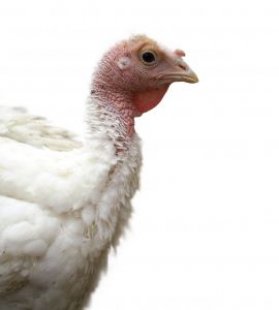Mailbag: Turkey = tryptophan = tired, right?

Wide-awake turkey approves of this blog entry.
Dear AllStarHealth,
You probably get this question around every Thanksgiving; what is it in turkey that makes people tired, is it really the tryptophan as everyone seems to suggest? I’ve tried taking tryptophan for insomnia and it didn’t seem to make me tired at all.
Thanks,
Frank Bucholz, Hanover, PA
A: The idea that it’s the tryptophan in turkey, and not other factors, that induces the post-meal drowsiness has been around for a long time now. It arose in the early 80’s when a then-bestselling book familiarized and popularized the amino-acid tryptophan as a dietary supplement for insomnia and mood support.
Tryptophan is used all over your body to support many different structures and functions. One of the ways the body uses tryptophan is to produce a neurotransmitter known as serotonin. Neurotransmitters regulate the way messages and impulses are communicated within the brain, nervous system and the rest of the body.
At the time the book was published, neurotransmitters were still incompletely understood with respect to their specific functions and how they relate to our mood, behavior and alertness levels. They still are, although a lot has been learned about them in the interim.
Serotonin was broadly characterized as an inhibitory neurotransmitter, meaning it can reduce the intensity of nervous system impulses and the body’s reaction to external stimuli like noises, and internal stimuli like stress and unpleasant emotions. It therefore has a role to play in inducing sleep but this role is more complex than previously assumed. And as you’ve noticed, even taking pure tryptophan is not a reliable way to induce drowsiness and promote sleep. Tryptophan does have that effect in some people, as does the related compound 5-HTP. But even for these people, tryptophan has to be taken on an empty stomach to “work”. That’s because amino acids like tryptophan must essentially compete with each other for absorption into the brain. Although turkey, like all animal proteins, contains tryptophan, the tryptophan in turkey is present with all the other amino acids.
So any drowsiness-inducing effect of tryptophan on the nervous system would only be decreased by consuming it in the form of turkey, which provides a rich ‘soup’ of many amino acids when digested.
Of the many factors that induce our our sense of tiredness and enable us to fall asleep, serotonin is only one. The are others such as blood sugar level, body temperature, physical activity level, and hormones like melatonin.
So why do people feel tired after a large Thanksgiving meal? It’s likely a combination of factors. Just eating any large meal tends to induce a soporific state. Add to that the fact that on Thanksgiving Day and the days just leading up to it, most of us are busily juggling multiple responsibilties; making travel plans, traveling, shopping, cooking, cleaning and coordinating things. It’s really only until after that Thanksgiving meal that we finally allow ourselves to sit down and relax, with the pressure of holiday expectations and obligations behind us. Often, it’s only then that the stress and emotions of the holiday begin to fade and our bodies and minds naturally seek a restorative and restful sleep. The nap or overnight sleep that follows can be one of the best of the year….but don’t blame the turkey!.
- Posted in Miscellaneous
- No Comments



